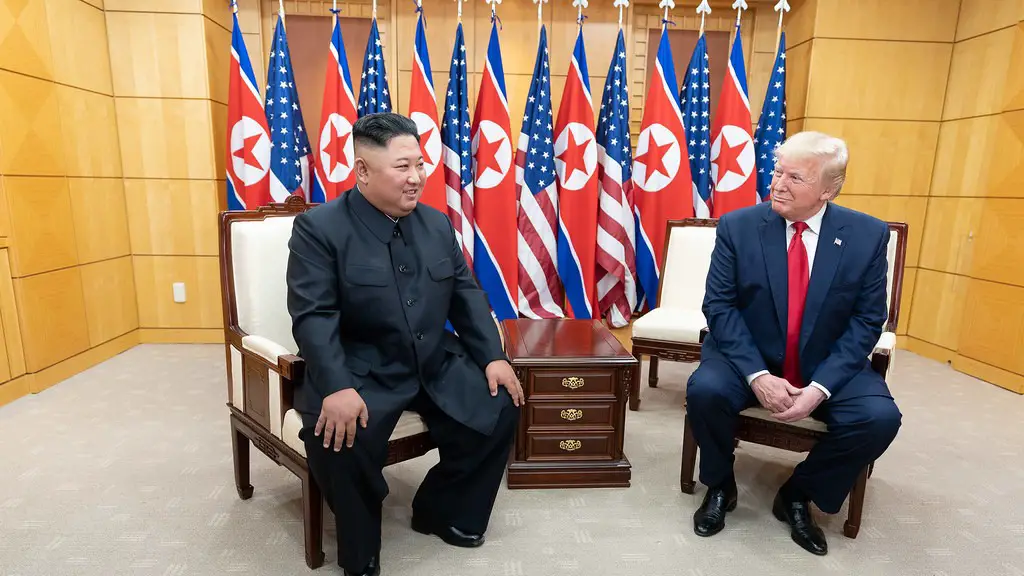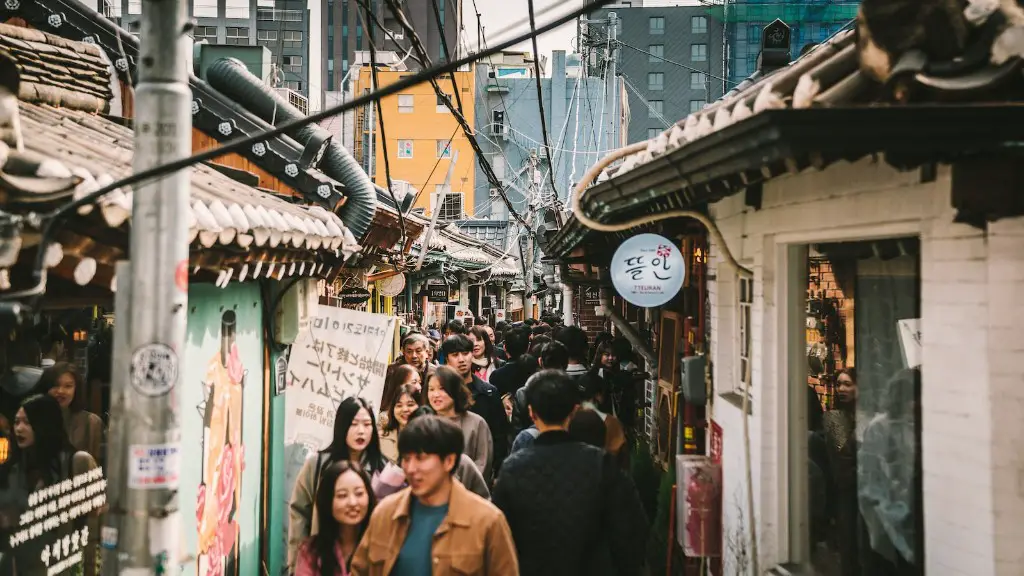North Korea is renowned for its adherence to the principles of extreme totalitarianism, which has included oppression of its own citizens, withdrawing from international relationship negotiations, and deprivation of essential human rights. The Democratic People’s Republic of Korea (DPRK) was founded in 1945, shortly after Japan’s surrender in World War II, to govern the area north of the 38th parallel. Divided into two occupation zones, America in the south and the Soviet Union in the north, after a regime change in the south in 1948, the Korean peninsula’s two regions adopted the two distinct governmental systems of communism in the north and democracy in the south. DPRK continued to live in a pervasive state of extreme totalitarianism, where state power and authority are forcibly centralized and the government is highly authoritarian with limited capacity for change.
Totalitarianism consists of a combination of tyrannical rule over citizens and draconian control over society, economy, and resources. DPRK’s regime is controlled through the state-directed propaganda and fear as a means to exercise control. North Korean citizens learn the Kim family and North Korean government leaders—the “Great Leaders” and “Eternal Leaders”—as divine figures, who should be respected without question. Furthermore, citizens in North Korea have to follow the state’s dictates and are afraid to express disagreement with the rules, as any form of opposition to the government is taken as a personal attack against Kim Jong-un and the leadership of the Korean Workers’ Party.
One of the essential features of totalism is the tight control over freedom of expression, enabling the government to control the flow of information to its citizens. DPRK limits or controls the access of many essential information sources, such as the internet and international newspapers. Media is strictly monitored, and any criticism of the government is prohibited. Nevertheless, over the past few years, the country’s strict regulation of information has caused the spread of mobile phones and people within the borders of North Korea have reported to gain unrestricted access to foreign websites, radio stations, and media from South Korea and other neighbouring countries.
Totalitarianism also involves government interference and control over the economy and trade. North Korea is known to closely monitor the economy and industry by tightly controlling trade networks, especially imports, in an attempt to create economic self-sufficiency and minimize the influence of other countries. For example, the government has utilized an oppressive tariff system to limit imports, particularly of food and technology. Furthermore, the growth of the “black market,” an area not controlled by the government, has helped to create a market-based system in North Korea and has accelarated with the development of technological and internet access. This has allowed more open trade with other countries and has provided for North Koreans a means to independently generate income, which has resulted in the gradual increase in their quality of life.
The government of North Korea has also worked to isolate the country from other countries as much as possible. For example, North Korea has refused to engage in all public communication with other countries, and has, from time to time, withdrawn from all international negotiations and international summits, citing threats from other countries. This means that international organisations and the United Nations are not able to effectively monitor the situation in North Korea, which effectively insulates the country from international scrutiny.
Overall, North Korea’s use of extreme totalitarianism constitutes a grave breach of international human rights law, as the government has denied its citizens such basic human rights as freedom of expression, assembly and association. As long as North Korean society remains under the totalistic rule of the oppressive government, citizens in North Korea stand to face serious human rights violations, such as inhumane treatment, substandard living conditions, limited access to medical services, and limited access to food and shelter for millions across the country.
Economic Impact
The global economic impact of North Korea’s totalistic rule is significant. There have been estimates that the loss of foreign aid and aid from individuals, as well as trade restrictions have exacerbated North Korea’s poverty, leading to a severe impact on its population’s quality of life. especially for those living in rural areas. North Korea’s government-created atmosphere of fear has driven away foreign investment, with foreign companies being unable to invest due to fears of political and economic instability. Furthermore, the lack of technology investment and uncertain international relations have limited North Korea’s economic development and its access to markets.
It is important to note that North Korea’s economic isolation is not only enforced by the government itself, but also by the strict economic sanctions imposed by the US and United Nations. These sanctions have hampered North Korea’s economy, severely limiting its ability to trade internationally and access foreign currency. As a result, these sanctions have also exacerbated poverty and human suffering in the country.
Overall, North Korea’s economic woes are largely a result of its government’s totalistic policies, which have made the country highly dependent on external aid. This lack of economic resources in turn, contributes to the country’s continued poverty and lack of education, the prevalence of child labor, and the near-complete absence of healthcare and basic safety.
Threat of Nuclear War
What is most concerning about North Korea’s totalitarian rule is the potential for nuclear war. North Korea’s government has consistently denied international human rights inspectors access to the country, and has built up nuclear and ballistic missile infrastructure, thus raising international concerns about its nuclear ambitions. These nuclear capabilities have posed a heightened risk of war in the region, with the potential of catastrophic consequences for the global population.
In defiance of international pleas, North Korea has continued to expand its nuclear arsenal and to test long-range missiles, countering US calls for denuclearization and sparking global conflict. The Trump Administration’s maximum pressure strategy, which is currently in place, is aimed at bringing North Korea to the negotiating table, but has failed to achieve the desired results, with North Korea continuing to test missiles and further entrenching its totalistic rule. This further demonstrates the dangerous potential of North Korea’s totalistic rule and its threat to global security.
North Korea’s totalitarian rule has thus resulted in numerous human rights abuses and has caused an immense threat to regional and global security. North Korea’s nuclear capabilities, limited access to the world economy, and oppressive government structures have meant that the country has been increasingly isolated from the international community, and its citizens have consistently suffered from human rights violations and extreme poverty.
International Response
International response to North Korea’s totalistic rule has been slow, often hampered by the country’s refusal to cooperate with international organisations and its continued isolation from the global community. Despite this, there has been coverage of the human rights atrocities committed by the North Korean government, with the United Nations and the international media drawing attention to the dire human rights situation in the country. However, international action has been limited, due in part to the powerful North Korean government’s capacity to repress any organised protests or suggestions of change.
Recently, China and South Korea have taken steps to facilitate change in North Korea by attempting to foster better relations and increased trade. These efforts have potentially offered a window of opportunity for diplomatic solutions and increased economic engagement, with the hope that this will bring about a better human rights situation in the country. Also, the United Nations has, in recent years, been putting more effort into pursuing human rights solutions in North Korea, albeit with limited success.
Ultimately, the only way to bring about real change in North Korea is for the country’s own citizens to stand up to the oppressive government and demand fundamental rights and freedoms. However, given the climate of fear in the country that keeps citizens from speaking out, this is extremely difficult. It is thus ultimately up to the international community to increase pressure on North Korea to encourage reform and bring human rights to the country more quickly.
Hope for the Future
While North Korea’s harsh totalistic rule remains in place, and there has been limited progress in terms of improving the human rights situation, there have been some recent encouraging signs. In 2018, North Korea and South Korea signed a historic agreement to work together to denuclearise the Korean peninsula, which was a major breakthrough for both countries. In 2019, North Korea and the US held several meetings, with both countries affirming the importance of engaging in ongoing diplomatic talks.
Furthermore, in 2020, North Korea has taken some steps to ease the totalitarian rule in the country, such as allowing greater foreign access and increased independent media consumption. There has also been some limited economic liberalization and greater engagement with foreign countries, particularly South Korea. While these steps are still in the early stages, they show that the North Korean government is beginning to open up, to a degree, and has the potential to move towards a more free and fair system of governance.
Ultimately, it is clear that North Korea’s totalistic rule must end in order for its citizens to gain full access to human rights and basic freedoms. It is thus up to both international organisations and legislators, as well as citizens in North Korea, to work together to find a solution and to bring about a more open and equitable system of governance in the country.




